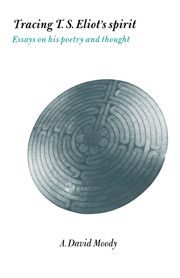2 - Passage to India
Published online by Cambridge University Press: 05 November 2011
Summary
Whitman's ‘Passage to India’ envisioned, in 1871, the opening up of India, and of more than India, to the West. The Suez Canal had just been completed; the telegraph cable had been laid across the Atlantic; and the Eastern and Western coasts of the United States had been linked by railroad. What else should follow but a passage of the eager American soul to India, to an India which represented ‘primal thought’ and primal Being –
Passage to more than India!
Are thy wings plumed indeed for such far flights?
O soul, voyagest thou indeed on voyages like those?
Disportest thou on waters such as those?
Soundest below the Sanscrit and the Vedas?
Eliot, when he attempted that passage and that sounding, discovered the practical difficulties. Sanskrit, he reported,
is not only a highly developed language but a way of thought, the difficulties of which only become more formidable to a European student the more diligently he applies himself to it.
It is those difficulties, difficulties which Eliot remained conscious of throughout his life, that have to be recognised when we consider his passage to India. His diligent immersion in certain Indie scriptures made him aware, beyond the profound human wisdom which drew him to them, of the distance between his mind and theirs. As E. M. Forster wrily observed in his A Passage to India, when the West really meets the East one result may be a sharpening of differences.
- Type
- Chapter
- Information
- Tracing T. S. Eliot's SpiritEssays on his Poetry and Thought, pp. 18 - 38Publisher: Cambridge University PressPrint publication year: 1996

